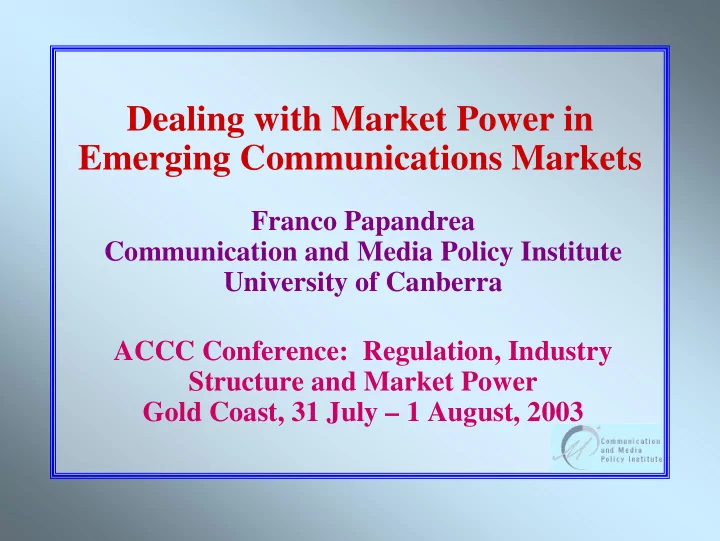

Dealing with Market Power in Emerging Communications Markets Franco Papandrea Communication and Media Policy Institute University of Canberra ACCC Conference: Regulation, Industry Structure and Market Power Gold Coast, 31 July – 1 August, 2003
Convergence and Regulation � Increasing substitution of delivery platforms � Distortion because of distinct regulatory treatment of: � Telecommunication services � Free to air broadcasting (radio and TV) � Pay TV � Other broadcasting (narrowcasting, datacasting, Multichannelling) � Internet ACCC Conference 31/7-1/8 2003 2
Convergence and Competition � Convergence suggests greater competition � However, outcome is not clearcut � At least three distinct possibilities � Dominant player in one market loses dominance in converged market � Dominant player in one market retains dominance in converged market � Non-dominant player in both markets becomes relatively more powerful in converged market ACCC Conference 31/7-1/8 2003 3
Convergence & Market Power � Convergence poses problems for regulators and regulation � Assessment of market power difficult � Power in pre-existing markets provides indication only where attributes of products do not change significantly in converged markets ACCC Conference 31/7-1/8 2003 4
Implications for Regulation � Do not impede convergence if there is no undesirable concentration of market power � Avoid different treatment of competitors � Reduce regulation if competition increases � Reconsider need for regulation when new services emerge � Consider how to treat new substitutes for regulated services � Increased risk for new investment ACCC Conference 31/7-1/8 2003 5
Assessment of Competition � Substitutability is key determinant � Effect of price change in one product on customer demand for other product (SSNIP) � Other factors include: � Market shares (indicates concentration) � Market behaviour (indicates market power) � Vertical and horizontal integration (indicates potential leverage of power in related market) � Barriers to entry (indicates contestability) � Dynamic characteristics of market ACCC Conference 31/7-1/8 2003 6
Assessment of New Technology � Lack data to test rigorously for market power � Care required in defining converging markets � Narrow definition likely to overstate market power � Wide definition likely to understate market power � Traditional tests may define markets narrowly � Static framework inappropriate for rapidly changing markets � With changing market potential competition more important than existing competition � Important to complement traditional tests with qualitative analysis ACCC Conference 31/7-1/8 2003 7
Some Examples of Problems � Cases illustrating some difficulties of defining markets and power � Foxtel-Australis merger proposals � ULLS declaration and ADSL competition notice � Bundling � Digital TV/Datacasting policy ACCC Conference 31/7-1/8 2003 8
Foxtel-Australis � Illustrates difficulty of defining market power changing market � “rapid growth of alternative … service provision means that market boundaries may change and … new markets may emerge in the near future” ACCC � ACCC’s concluded Pay TV and FTA TV were in different markets. � Merger seen as substantial reduction of competition in Pay TV market � ACCC also concerned with effects in other markets including local telephony and broadband services � First-mover advantage also a concern ACCC Conference 31/7-1/8 2003 9
ULLS And ADSL � Concern about first-mover advantage � Written assurances by Telstra not to introduce ADSL ahead of ULLS � Simultaneous introduction did not avert attempts to use to frustrate competition � Several disputes on ULLS pricing and issue of Competition Notice on ADSL one year later � Telstra took further nine months to comply with notice and settle ULLS pricing disputes ACCC Conference 31/7-1/8 2003 10
Bundling � Depending on nature of market bundling can be beneficial or detrimental to competition � Benefits – improved efficiency in supply, pricing and marketing � In competitive markets many of the benefits are passed to consumers � Where there is market power in at least one of the bundled goods, bundling can be anticompetitive � Difficult to set a standard approach to regulation ACCC Conference 31/7-1/8 2003 11
Digital TV & Datacasting � Example of wrong approach � Costly policy that stifles competition � Main anticompetitive effects are � Ban on new FTA TV at least before 2007 � HDTV standard that locks up all the available spectrum until digital conversion is completed � Ban on multichannelling; and � Arbitrary definition of a new service resulting in no one interested in bidding for a datacasting licence ACCC Conference 31/7-1/8 2003 12
Recommend
More recommend